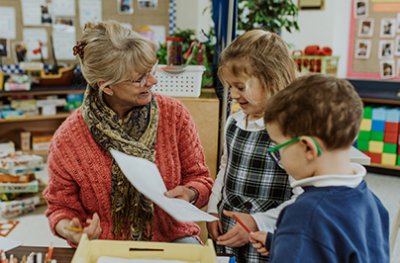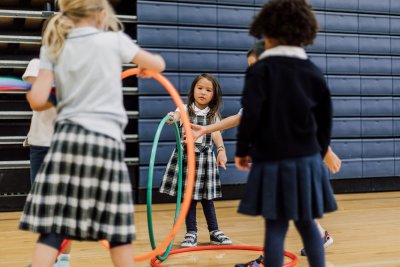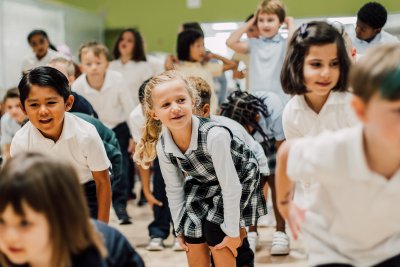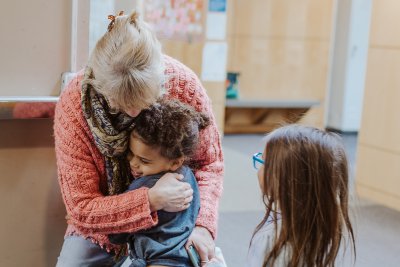March 12, 2020
 At Mounds Park Academy, a private school in Saint Paul, the words “kindergarten” and “joy” are inseparable. And it doesn’t matter who’s describing the experience. When asked what she loves about teaching kindergarten, MPA’s Kristine Petersen said immediately, “Pure joy!” While Petersen didn’t specify if it was her joy or that of her students, it’s clear from a parent’s feedback that it’s both.
At Mounds Park Academy, a private school in Saint Paul, the words “kindergarten” and “joy” are inseparable. And it doesn’t matter who’s describing the experience. When asked what she loves about teaching kindergarten, MPA’s Kristine Petersen said immediately, “Pure joy!” While Petersen didn’t specify if it was her joy or that of her students, it’s clear from a parent’s feedback that it’s both.
“Our daughter seems so committed to school because of her joy for it, which is the goal. She not only believes in the joy of school, but she trusts in the joy and excitement Ms. Petersen brings to learning and to the classroom!”
Introducing Mounds Park Academy’s Interdisciplinary Approach in Kindergarten
Educational experiences are more authentic and of greater rigor when students learn through an interdisciplinary approach—it is deeper and more reflective of the real world. Interdisciplinary teaching helps students make connections among math, science, social studies, language arts, and fine arts, integrating knowledge and increasing student engagement.
MPA introduces its interdisciplinary approach in kindergarten in an age-appropriate way. When students study the letter “R,” for example, they might complete a mystery puzzle revealing a rabbit by following teacher directions and coloring a mystery grid. The teacher references shapes such as triangles, diagonals, and rectangles as part of the directions. The students then create a math problem with the puzzle.
Students might then sing a little rhyme about a rabbit and talk about rhyming words. Finally, the teacher might read a book about rabbits and their natural habitat or, to reinforce character traits, read a fictional story about a rabbit who showed compassion to others.
This kind of deep learning engages the whole student—heart, mind, body, and soul—ensuring more meaningful understanding (as opposed to rote memorization).
 Learning by Doing
Learning by Doing
The overarching philosophy at MPA is that kindergartners learn best by doing. MPA kindergartners move, play, dream, and do. The teachers present every single day as filled with wonder. In an MPA kindergarten class, education is fun, meaningful, purposeful, challenging, and always hands-on.
For example, students:
- manipulate objects in math to create number bonds;
- play games and build structures to learn about balance, motion, and innovation;
- make and play with various materials in science to learn about chemical reactions;
- sing and dance to learn concepts like rhythm, beat, how to match pitch, and new vocabulary in Spanish and French;
- work together on projects to advance critical skills in listening, sharing, compromising, helping, and empathizing.
While the children see these activities as fun, the teachers are intentionally advancing their knowledge in rigorous ways. This motor activity allows teachers to access far more neural pathways than a traditional lesson plan ever could.
Setting the Foundation for Academic Success
At every level of education, MPA fosters a spirit of innovation that fuels creative thinking and sparks a passion for learning. MPA students tend to be self-motivated and self-directed learners who thrive in the challenging, but not overly competitive, academic environment. And all of this starts in kindergarten and follows students through high school.
“We encourage our students to share their ideas, but also respectfully listen to other’s opinions. Through this learning exchange, we witness a do-right attitude,” says Ms. Petersen. “We value collaboration, which leads to making a difference within our hallways and around the world. Our community is passionate and coupled with a learning environment that promotes individual growth within a team effort.”
According to Lower School director Renee Wright, Ms. Petersen does a great job instilling a love of learning in their kindergarten students. “Parents say that their students love school and proudly tell others about things they do or learn,” she says.
 Promoting Social and Emotional Growth
Promoting Social and Emotional Growth
Talking about character traits is an important part of kindergarten at MPA. Lower School teachers have carefully crafted and implemented a formal character development program called CHAMP—Character Happens at Mounds Park. Each month, PreK through fourth grade students come together to learn about character traits such as friendship, cooperation, compassion, respect, self-control, responsibility, inclusiveness, and integrity.
“Our character programs permeate every area of learning PreK-12. As a community, we provide multiple opportunities for each student to use their character skills throughout the day. When students have a strong foundation of healthy social and emotional development, it gives them more time to concentrate on their academic potential,” says Ms. Petersen.
Another unique aspect of MPA’s character development program is that students teach each other these traits. In addition, MPA embeds service-learning in the CHAMP program and the academic curriculum. Students see that they are able to meet genuine community needs, learn the importance of helping others, while simultaneously achieving rigorous learning goals.
Learning through Small Class Sizes and Conversations
Throughout the school year, MPA kindergartners are talking to and engaging with others all day long. They are sharing their thoughts, feelings, opinions, ideas, and questions. They are working collaboratively to complete projects and assignments. The constant conversations provide our teachers valuable insight into how the students think and learn, which they use to help each child reach his or her fullest academic and social potential.
Having small class sizes is critical to both promoting conversations in the classrooms, as well as to ensuring that every child is known and understood. MPA teachers are closely attuned to the gifts and challenges of each child in the classroom, and they know how to bring out the best in everyone. Each child gets the attention he or she deserves. As a school, MPA is intentionally small because we believe that small classes and a connected community create the best learning environment for all children, particularly in kindergarten.
“Small class sizes allow us to differentiate our teaching to meet the wide range of academic strengths at this age,” said MPA Lower School teacher Scott Wilson. “In order to embrace wonder and creativity in each child, as we do, we need to be sure that we are encouraging our students based on where they are and how their individual skills are developing.”
Enjoying the Benefits of Specialists in Kindergarten
We believe in creativity at MPA, embracing and nurturing every child’s inherent interest in self-expression. We engage our students in music, art, drama, world language, physical education, library, and computer courses at every academic level, most of which start in kindergarten, to expand their interests and learning.
In many schools, classroom teachers instruct the specialty classes, too. But at MPA, kindergartners experience music, art, world language, and more with educators who are specialists in these areas. Being taught by specialists at such a young age jump-starts our focus on guiding students in developing their own artistic skills and giving them the chance to explore, create, and express their ideas through art, performance, and music.
 Creating Strong Partnerships with Parents
Creating Strong Partnerships with Parents
“Parenting is a greater challenge than we could have possibly imagined. Partnering with MPA to help us educate and raise our children gives us a great sense of comfort in knowing that the school we chose is as devoted to seeing our children develop to their full potential as we are,” said the Alvarenga family.
MPA teachers believe in strong partnerships with our families, encouraging them to share their thoughts and ideas formally and informally throughout the school year. One comment has consistently surfaced in Petersen’s solicitation of feedback: parents wish they could re-do kindergarten at MPA.
“Joyful learning truly takes place in our kindergarten rooms,” says Wright. “Students come to school happy and excited to engage in the learning process because learning is fun. When I stop by the kindergarten room, I see pure joy on their little faces and sparkles in their eyes.”
Kindergarten at MPA is pure joy.